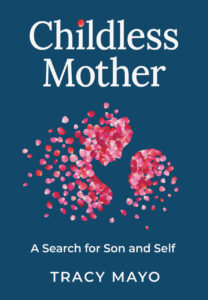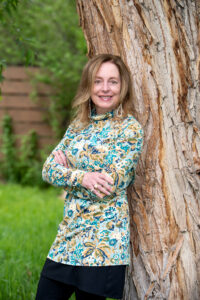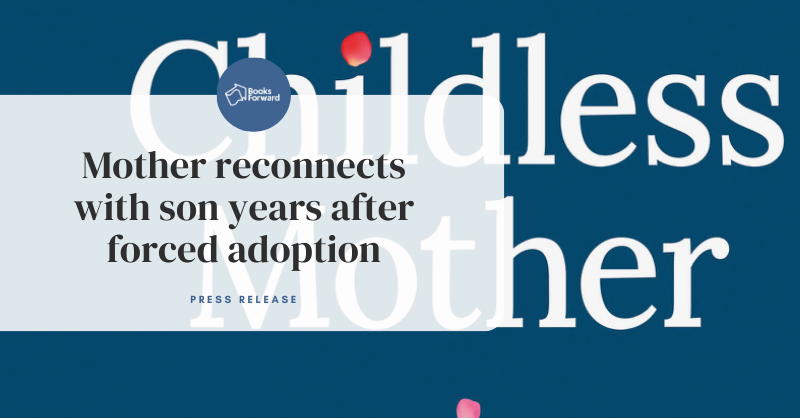“Tracy Mayo breaks ranks with the institutionalized secrecy, shame, and silencing that shattered countless pregnant girls and young women prior to legalized abortion and open adoption.” – Kate Moses, author of “Wintering, Cakewalk: A Memoir, and Mothers Who Think”
 BOULDER, Colorado – Debut author Tracy Mayo had a successful career, but one choice from her past continued to haunt her: forcibly giving up her baby at the age of fifteen. Now she’s sharing the inspiring story of her impossible journey to find him during the pre-Internet era in her memoir, “Childless Mother: A Search for Son and Self” (Vanguard Press, Mar 28, 2024).
BOULDER, Colorado – Debut author Tracy Mayo had a successful career, but one choice from her past continued to haunt her: forcibly giving up her baby at the age of fifteen. Now she’s sharing the inspiring story of her impossible journey to find him during the pre-Internet era in her memoir, “Childless Mother: A Search for Son and Self” (Vanguard Press, Mar 28, 2024).
Before Roe v. Wade, Tracy Mayo found herself pregnant at the age of fourteen and exiled to a maternity home. There, she bore not only a child but also the weight of the culture’s shame. She was required to surrender her newborn baby boy – the only child she would ever have – and expected. “You’ll forget it ever happened,” she was told.
Twenty-two years later, her longing undiminished, with no internet, DNA testing, and not even knowing his adoptive name, Tracy set out to find him – and in her search she finds more than just her son, but herself. In a world drifting back to where women have no agency, Tracy’s story of one frightened, grief-stricken young mother who was ordered to forget may be even more important to remember.
“Childless Mother: A Search for Son and Self”
Tracy Mayo | March 28, 2024 | Vanguard Press | Memoir
Paperback | 9781837940240 | $19.99 USD
 TRACY MAYO has two degrees from Duke University. After a homesteading experiment, she embarked on a thirty-year career in commercial construction management, as a trailblazing woman in a man’s world. She is a 2020/2021 artist-in-residence at Craigardan and an alumnus of the Bookgardan writing program. Her writing has appeared at Aspen Summer Words’ juried workshops, in Heimat Review, and in The Ocotillo Review. Tracy lives in Boulder, Colorado, with her husband and Flat-Coated Retriever.
TRACY MAYO has two degrees from Duke University. After a homesteading experiment, she embarked on a thirty-year career in commercial construction management, as a trailblazing woman in a man’s world. She is a 2020/2021 artist-in-residence at Craigardan and an alumnus of the Bookgardan writing program. Her writing has appeared at Aspen Summer Words’ juried workshops, in Heimat Review, and in The Ocotillo Review. Tracy lives in Boulder, Colorado, with her husband and Flat-Coated Retriever.
Follow Tracy Mayo on social media:
Instagram: @TracyMayoAuthor | LinkedIn: @TracyMayo | Facebook: @TracyMayoAuthor
In an interview, Tracy Mayo can discuss:
- How she navigated through a young pregnancy before Roe v. Wade
- How she went about searching for her son without any information
- The time she spent within a maternity home and its effects on her mental health
- Her journey with meditation and LSD as forms of therapy to deal with grief
- How she managed her relationship with her own parents, her son, and her son’s adoptive parents
- Why her story plays as a cautionary tale in the current overturning of Roe v. Wade
- The arduous task of keeping her son’s birth a secret and how its destructive power impacted her
Advanced praise for Childless Mother
“Mayo creates a compelling nonfiction narrative that effectively conveys her feelings as a child and as an adult dealing with the fallout of choices her parents made…examines the complexities of reuniting with children given up for adoption—including birth parents’ acceptance of, and by, the families that raised their children—in a nuanced and insightful manner.”
-Kirkus Reviews
“Tracy Mayo breaks ranks with the institutionalized secrecy, shame, and silencing that shattered countless pregnant girls and young women prior to legalized abortion and open adoption.”
– Kate Moses, author of “Wintering, Cakewalk: A Memoir, and Mothers Who Think”
An Interview with
Tracy Mayo
1. In your writing, you discuss the military culture that you grew up in? How did this experience affect your life as you became pregnant?
I think in part, the experience helps explain why I became pregnant. The constant moves, the ever-changing landscape (eight moves in my thirteen short years) made me long to have friends, to feel rooted. When I met Ken Locke, a kindred navy spirit, I found someone who understood what it feels like to pack up and start one’s life over every year or two. Additionally, the military culture – in which we were expected to appreciate protocol, conformance, obedience, and discipline – was a prime target for adolescent rebellion, especially for an only child like myself, long the focus of my parents’ intense aspirations.
2. During your search for David, what aspects did you find the most challenging?
The simple answer to this question is a question itself: How do you find someone when you don’t know who you are looking for? All I had to go on was his place of birth and his birth date. His real birth certificate (with his given name at birth) was in a sealed file in the state capitol and an “amended” one issued with his new name and his adoptive parents’ names. Birth parents have no rights to information in Virginia, other than the very rudimentary “non-identifying information” I was provided at relinquishment. Because I had been told that he was adopted by a military family, I assumed he had moved around like I had. Where might he be and who might he be? It was a daunting challenge.
3. When you and David first met, you discovered that the two of you had many similarities despite being raised very differently. Did this surprise you?
Upon exchanging photos, we realized we looked very much alike. But I think both of us were surprised to discover our many common interests: bird-watching, in-line skating, tastes in music, and an abiding interest in wildlife and the natural world. I learned that my university would have been his first choice if money had been no object. And when younger he was interested in becoming a naval aviator, like the birth grandfather he hadn’t yet met. The synchronicities kept crashing down. Does this mean there is a genetic component to personal preferences?
4. You discuss a lot of heavy topics when recalling your past experiences. What effect did writing this story have on you?
I did a lot of healthy grieving while unearthing long-buried painful memories. And in taking charge of my own search, I felt empowered for the first time in decades. On a few occasions during my search when I came across written documentation of what had happened, I had this flush of feeling that I hadn’t imagined my son, hadn’t dreamed him up. After being instructed “To Forget,” and not allowed to speak of his birth around my own parents, I finally was receiving validation – which for so long, in almost every context, I had not. Recounting this process in writing has proved to be healing.
5. In terms of your son, his adoptive parents, as well as your own parents, did you find yourself taking risks while recounting your story?
It’s difficult to write about people who are still alive. I waited to start this memoir until my parents had died, as I knew I would struggle to speak my raw truth if they were here to read it. But observing the close relationship that David had developed with them, I felt a great measure of forgiveness and compassion. I took a risk re my son – would he view his upbringing differently from my perception of it? How would he view my take on our relationship? And on behalf of his adoptive parents, who passed away before this memoir was published, did I properly reveal the depth of my gratitude to them, for loving him as they so fully did?

A former award-winning journalist with national exposure, Marissa now oversees the day-to-day operation of the Books Forward author branding and book marketing firm, along with our indie publishing support sister company Books Fluent.
Born and bred in Louisiana, currently living in New Orleans, she has lived and developed a strong base for our company and authors in Chicago and Nashville. Her journalism work has appeared in USA Today, National Geographic and other major publications. She is now interviewed by media on best practices for book marketing.

